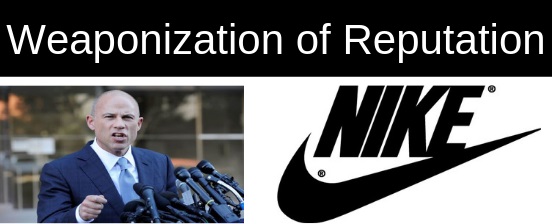Threats are part of life, and we learn about them at a young age. Profanity earns soap in the mouth. Bad grades and your phone is taken away. And my childhood demon, failure to eat vegetables means no dessert. The internet has taken threats to another level as some folks have taken to threatening your reputation as a means to an economic end. We are witnessing the weaponization of reputation.
Last week, attorney Michael Avenatti, famous for representing porn star Stormy Daniels, was arrested and accused by federal prosecutors of trying to extort Nike for $25 million. From CNBC:
Prosecutors said Avenatti threatened to hold a press conference accusing the company of being involved in bribing amateur basketball players. Avenatti allegedly timed his threats to coincide with Nike’s quarterly earnings call and the kickoff of the NCAA basketball tournament. According to a criminal complaint, Avenatti offered to refrain from that press conference “only if Nike made a payment of $1.5 million to a client of Avenatti’s in possession of information damaging to Nike … and agreed to ‘retain’ Avenatti and [the co-conspirator] to conduct an ‘internal investigation’ — an investigation that Nike did not request — for which Avenatti and [the co-conspirator] demanded to be paid, at a minimum, between $15 [million] and $25 million.”
So if you believe the allegations, Avenatti was trying to shake down Nike, but the muscle was not that he would turn-in the swoosh company to legal authorities but rather that he would use his media platform to ruin the reputation of the Nike brand. He threatened a virtual whack to the reputational kneecaps, allegedly.
To be clear, lawyers have been publicizing legal cases forever, and I have helped a lot of them do it – more on this in a moment. And I’m sure that attorneys threaten media exposure on a regular basis. What makes this different is that Avenatti wasn’t just trying to get a favorable outcome for his client, he was also allegedly piggybacking on the case for his own financial benefit – all at the expense of Nike’s reputation. You be the judge.
A few years back, I launched a website called LawsuitPressRelease.com. The tagline is “win your case in the court of public opinion.” It’s project-based PR. We review an existing lawsuit and draft a news release about the case and then distribute it to media outlets. We only write releases about lawsuits that have been filed, and we base the release on the facts in the public documents. We have publicized many cases and exerted media pressure that has sped-up settlements and drawn a lot of attention. I’m proud of it and have many happy clients. But we don’t threaten. Quite simply, we amplify what’s already been stated in public filings.
Avenatti’s alleged extortion move is an extreme case of weaponizing reputation, but it happens on a lesser scale all the time. For example, unhappy restaurant patrons regularly angle for a freebie in exchange for withholding a negative review. And some variant of this behavior may have happened at your business.
It’s important to note that such behavior is in violation of the general guidelines of most review sites. For example, it’s a no-no on Yelp, according to my interpretation of its guidelines.
Demanding payment: Beyond simply asking for a refund to remedy a bad experience, you should not use removing or posting your review as a way to extract payment from a business, regardless of whether you’ve been a customer.
As I see it, just as a business owner should not pay for good reviews, a patron shouldn’t ask for something for free in return for refraining from posting a bad review. If you are the victim of such a situation, you can flag the review and make your case to the review site. I’m happy to help with this if you ever need assistance.
Yet the larger lesson is that while we should be aware and wary of the power of online reputation, we shouldn’t let it be used against us illegally or unfairly. If someone tries to extort you, be like Nike and contact law enforcement. If a customer threatens a bad review in exchange for cash, remind them that it’s against the rules of the review sites and you won’t stand for it.
While customers shouldn’t brandish reputational attacks as a weapon, they still have an expectation of good service. And business owners should still strive to offer it. So if you do, for example, spill soup on a customer at your restaurant, make it right however you can. Pay for their dry cleaning or offer them a free dessert – as long as they eat their veggies.
–John

